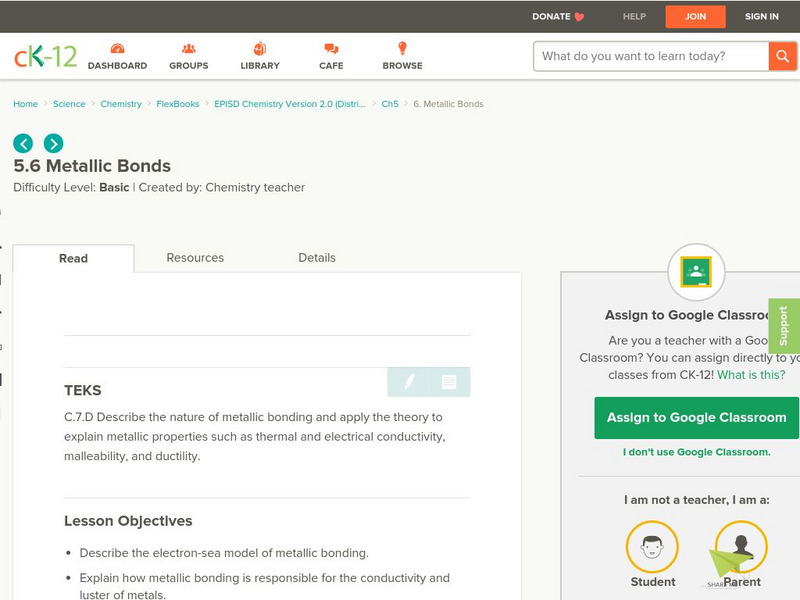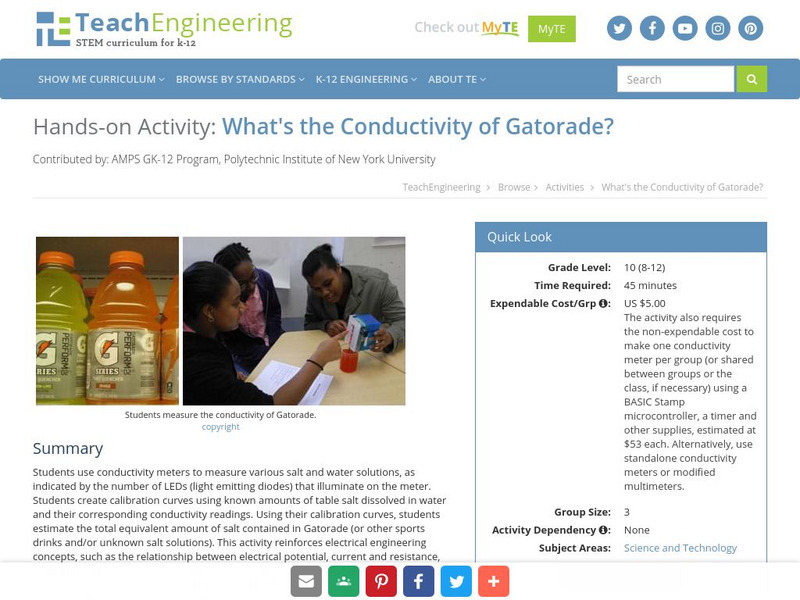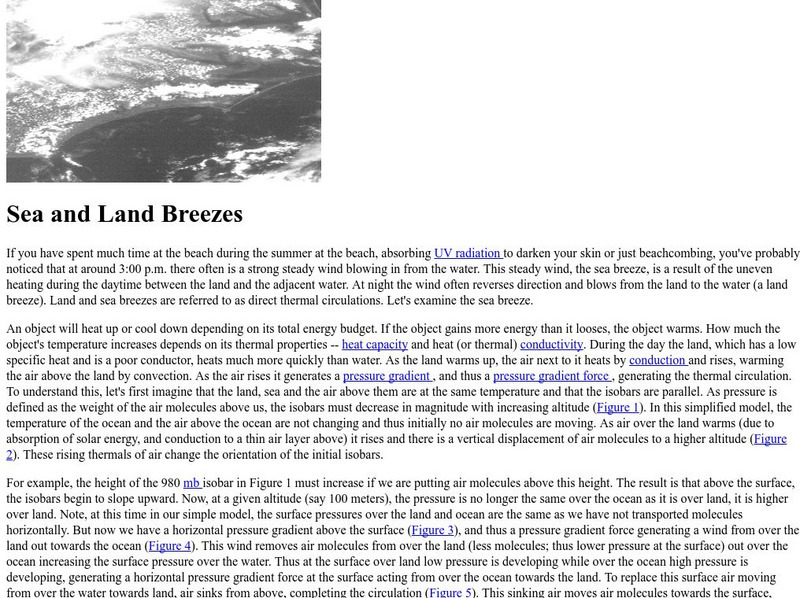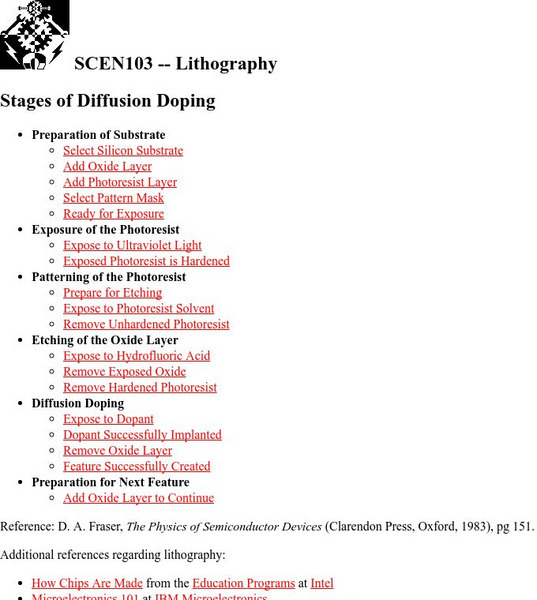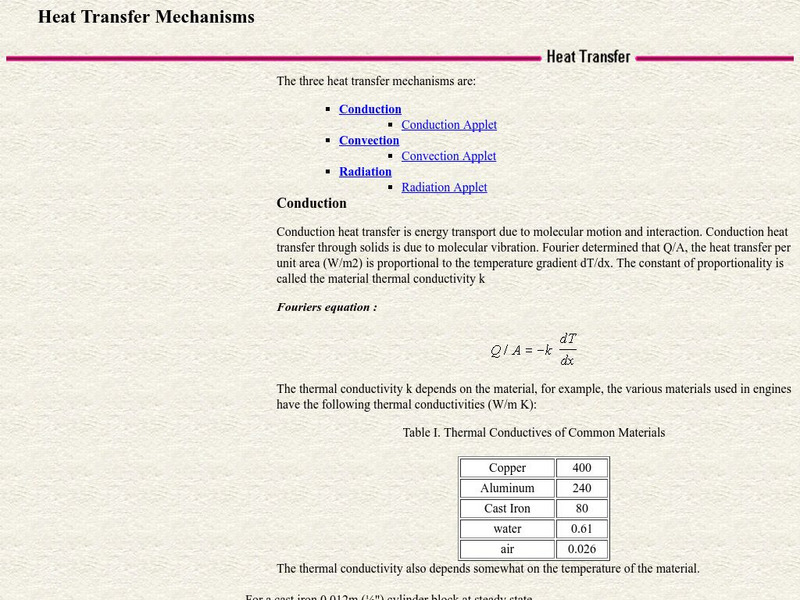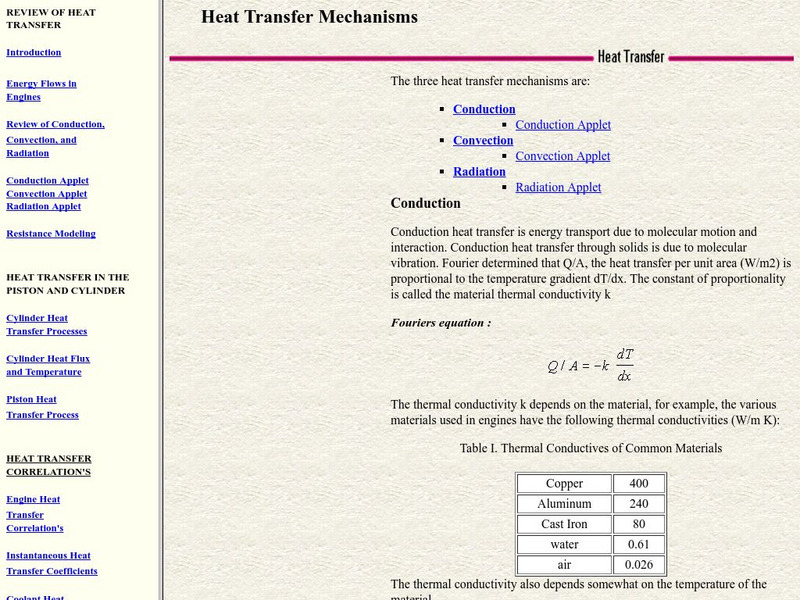US Geological Survey
Usgs: Water Properties and Measurements
Learn about the various attributes of water and how they affect life on Earth.
Canada Science and Technology Museum
Canada Science and Technology Museum: Background Information for Electricity
The Canada Science and Technology Museum answers some of the most common questions about electricity. For example, get the definition of electricity, the difference between alternating and direct currents, and learn how a fuse works.
CK-12 Foundation
Ck 12: Metallic Bonds
[Free Registration/Login may be required to access all resource tools.] In the following online tutorial, students will begin to describe the electron-sea model of metallic bonding. They will explain how metallic bonding is responsible...
Georgia Department of Education
Ga Virtual Learning: Currents, Resistors, and Power
In this interactive tutorial students will learn about electric current, resistance and current density. Learn how current density relates to electric field strength and how resistance produces heat.
TeachEngineering
Teach Engineering: Saltwater Circuit
Students build a saltwater circuit, which is an electrical circuit that uses saltwater as part of the circuit. Students investigate the conductivity of saltwater, and develop an understanding of how the amount of salt in a solution...
TeachEngineering
Teach Engineering: Will It Conduct?
Students build their own simple conductivity tester and explore whether given solid materials and solutions are good conductors of electricity.
TeachEngineering
Teach Engineering: Conductivity
Students make a simple conductivity tester using a battery and light bulb. They learn the difference between conductors and insulators of electrical energy as they test a variety of materials for their ability to conduct electricity.
TeachEngineering
Teach Engineering: What's the Conductivity of Gatorade?
Students use conductivity meters to measure various salt and water solutions, as indicated by the number of LEDs (light emitting diodes) that illuminate on the meter. Students create calibration curves using known amounts of table salt...
Texas Education Agency
Texas Gateway: Chemical Bonding: Metallic Bonds
Given scenarios or diagrams, students will describe the nature of metallic bonding and explain properties such as thermal and electrical conductivity, malleability, and ductility of metals.
Chemicool
Chemicool: Berkelium
This site provides basic information and physical data on berkelium, all arranged in an easy to follow, clear manner.
Chemicool
Chemicool: Bromine
A nicely organized summary table with information on the properties of bromine. Very helpful and easy to follow.
Oak Ridge National Laboratory
Ornl: Teacher's Guide Superconductivity for High School Students
This site from the Human Genome Project provides a large collection of facts and information, demonstrations, experiments and project ideas. Written for teachers but easily adaptable for any type of student work. A good site to check out...
Other
Water on the Web
Water on the Web (WOW) is an advanced site allowing students to actively participate in data analysis from real research sites. Lesson plans on a range of topics are provided. There is also a tutorial for using Excel to graph WOW data.
National Geographic
National Geographic: Building Circuits
In this lesson, students build series and parallel circuits and test their conductivity. Includes handouts with diagrams, and a vocabulary list with definitions.
Utah Education Network
Uen: Conductivity and Bonding
Students will measure the conductivity of several compounds and solutions in order to predict the bond types (ionic or covalent) in the substances tested.
University of Wisconsin
University of Wisconsin Madison: Sea and Land Breezes
This site from the University of Wisconsin-Madison contains a medium length article on sea and land breezes. Throughout the article links are provided for additional information on related subjects. A picture is also given.
Texas Instruments
Texas Instruments: Conductimetric Titration & Gravimetric Determination
Students use a Conductivity Probe to measure change in conductivity during a chemical reaction and determine the equivalence point of the reaction They determine the mass of the product and calculate the molar concentration of the...
Texas Instruments
Texas Instruments: Investigating of P H and Conductivity During a Titration of A
In this investigation sulfuric acid will be added to a solution of Ba(OH)2 using a pH probe and a conductivity probe. From this process the pH of first and second equivalence points will be determined along with mapping the conductivity...
Science Education Resource Center at Carleton College
Serc: Investigating Testing for Electrical Conductivity Using Materials
In this activity, students will understand that electricity moves through different circuits and discover what types of materials are conductors and insulators.
Science Education Resource Center at Carleton College
Serc: Conductivity of Water
Students discover that pure water does not conduct electricity and that dissolving different substances in water may or may not cause it to conduct electricity.
Other
University of Delaware Physics Department: Lithography
University of Delaware Physics Department provides this indexing page for a slide show presentation.
Other
Univ. Of Delaware Physics: More Semiconductor Physics
The University of Delaware Physics Department provides this site from a site titled "Silicon, Circuits, and the Digital Revolution," here is a series of four pages which explain the details behind how semiconductors work. An introduction...
Colorado State University
Csu: Heat Transfer Mechanisms
An excellent page from the Colorado State University with a heavy mathematical emphasis. Each form of heat transfer--conduction, convection, and radiation--is defined, compared, and contrasted. Mathematical equations governing the rates...
Colorado State University
Colorado State University: Heat Transfer Mechanisms
An excellent page from the Colorado State University with a heavy mathematical emphasis. Each form of heat transfer--conduction, convection, and radiation--is defined, compared and contrasted. Mathematical equations governing the rates...



